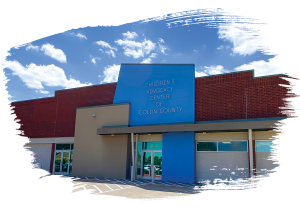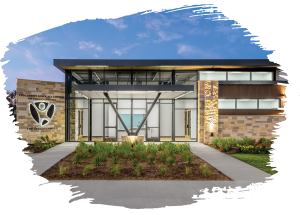FIRST VISIT
At Children’s Advocacy Center of Collin County, we are committed to helping your family during this difficult time. We hope this information will help you understand the roles of the various agencies involved in your child’s case and the services available to assist you and your family.
Our Locations
We offer services at two locations in Collin County. You will be given the location of your appointment by CPS and/or law enforcement.
What happens at Children's Advocacy Center of Collin County?
We are a non-profit organization that works in collaboration with other agency professionals (the multidisciplinary team) to ensure coordinated case response that recognizes the unique needs of your child. These professionals are dedicated to supporting you, your child, and your family. The team includes law enforcement, the Department of Family and Protective Services, forensic interviewers, therapists, family advocates, child engagement advocates, medical providers, and prosecutors.
When you arrive
When you arrive for your scheduled appointment, please inform the receptionist that you are here for a forensic interview. The receptionist will have everyone sign in and give you a visitor’s badge.
You will then sit in the waiting room, and a family advocate and child engagement specialist will come to greet you and bring you to a private meeting space.
The child engagement specialists will help your child feel comfortable before they speak with a forensic interviewer. Your child will learn about the person who will be interviewing them, will get to see where their interview will take place, and will have a chance to ask any questions they may have.
We want to ensure your child feels safe and that they are informed of the process. The family advocate will meet with you during your child’s forensic interview to help answer your questions and inform you about the services we offer.
What do I tell my child about the appointment?
We understand that explaining to your child what a child advocacy center is can seem overwhelming. You know your child best, so we encourage you to speak to them at their level of understanding and to be honest.
For younger children, we recommend saying:
We are going to a special place where kids go to talk about important things. The person you will talk to speaks to kids every day about different things. It is okay to tell them everything, and you are not in trouble.
For older children, we recommend saying:
We are going to Children’s Advocacy Center of Collin County, and we want you to know you are not in any trouble. You will talk to a person who is going to listen to you, ask you questions, and get to know you better. You need to be honest. It is okay to be nervous. There are people at the center who will help you.

Dos:
Tell the child about their appointment.
Tell the child to tell the truth.
Reassure the child that you will be there to support them no matter what happens and that they are not in trouble.

Don'ts:
Discuss the investigation in the child’s presence.
Tell the child they are going to a doctor’s visit.
Offer the child a bribe for telling the truth about what happened.
Practice what they will say.
The goal of a forensic interview is to collect vital information from a child in a neutral, non-leading way to be utilized during a child abuse investigation.
Who will my child talk to?
Your child will be talking to one of our specially trained forensic interviewers. Forensic interviewers work for our center and are skilled in talking to children and teenagers by asking non-leading, open-ended questions to gather information. Our interviews take place in a room equipped with comfortable chairs, recording equipment, and digital boards.
It is important that your child feels comfortable, so if your child needs a break, a drink, or a bathroom break during the interview, they will be provided with those things.
Will I be able to watch my child’s interview?
We understand that parents may want to be present for the interview; however, we find that it can be difficult for children to talk about things they have experienced, and difficult for parents to hear. Having a parent in the room may distract or inhibit the child during the interview. Children may also want the parent to answer the questions for them if they are present in the forensic interview.
Only professional members of the multi-disciplinary team observe the forensic interview from another room. This provides the most neutral setting for your child to be able to speak openly. The professional team members who watch the interview are responsible for observing, assessing, and investigating the allegations.
All forensic interviews are recorded to limit the number of times a child must talk about their abuse. The recording is only released to law enforcement, the Department of Family and Protective Services, and/or prosecuting attorneys, if requested. To ensure confidentiality, the recording is not released to anyone else without a court order.
How long will my appointment be?
Every appointment is different; however, you should plan for two hours. We will provide you with a school and work excuse note.
What happens after my child’s forensic interview?
Once the interview is complete, you will speak with the detective and/or CPS worker (if applicable) to discuss the status of the case. They will tell you in general terms what they learned from the interview, and you will have the opportunity to ask questions.





